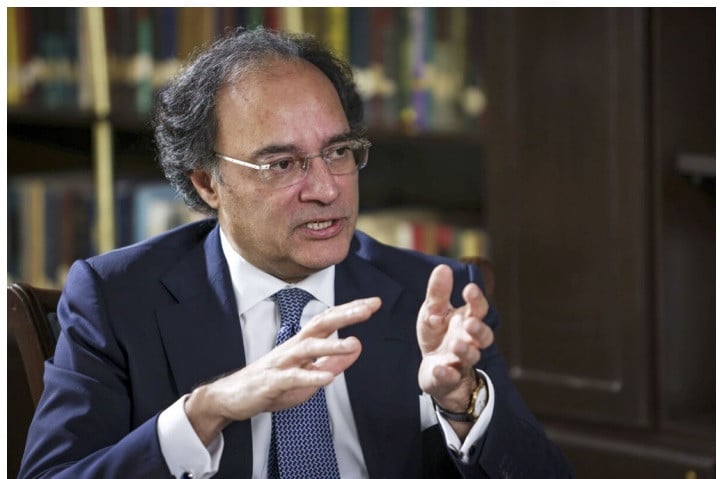By Staff Reporter
ISLAMABAD: The finance minister on Monday pitched the country’s lucrative IT and agriculture sectors to Mashreq Bank, as the country seeks to revive ties with the UAE lender and tap into its investment potential to bolster a fragile economy.
In a virtual meeting with Mashreq Bank’s CEO Ahmed Abdelaal, Minister Muhammad Aurangzeb discussed opportunities in infrastructure, energy, technology, agriculture, and small and medium-sized enterprises (SMEs) to enhance collaboration between the two countries in remittances, trade, finance, and Islamic banking.
“The minister greeted Ahmed Abdelaal and expressed appreciation for Mashreq Bank’s interest in Pakistan’s financial landscape and expressed keen interest of the government to re-engage with the Bank,” the finance ministry said in a statement.
Aurangzeb emphasized the significant potential of Pakistan’s IT and agriculture sectors, urging increased investment from both local and international stakeholders to drive economic growth.
A recent internet slowdown in Pakistan, reportedly caused by the installation of a firewall to censor criticism on government institutions, has drawn ire from IT professionals, including freelancers, who face cancelled work due to disruptions.
The Pakistan IT association warned that the country may incur losses of up to $300 million due to the slowdown, which reached 40 percent according to tracking firms.
Still, the ICT exports surged 33.64 percent to $286 million in July. The increase from $214 million in July last year marks a strong start to the financial year 2024-25, with the IT ministry attributing the growth to support and initiatives by the Special Investment Facilitation Council (SIFC) and Pakistan Software Export Board (PSEB).
The IT & ITeS industry achieved a trade surplus of $252 million, up 32.63 percent from $190 million in July 2023, accounting for 88 percent of total ICT export remittances.
In contrast, the services sector recorded a trade deficit of $159 million in July, while ICT exports accounted for 46 percent of total services exports, outpacing ‘Other Business Services’ at $128 million.
Pakistan aims to increase its information technology exports to $25 billion, with the under-construction Islamabad IT Park expected to play a key role.
Prime Minister Shehbaz, chairing a review meeting on IT sector projects, was briefed on initiatives to enhance exports and digitization. A $77 million government investment in the sector was expected to generate an additional $2.5 billion in exports.
The IT Park project, being built with Korean assistance, has had its completion date brought forward to February 2025 from June 2025. The prime minister directed officials to further reduce the construction timeline after consulting with Korean experts.
A pilot project for Digital Smart Cities, starting with Islamabad, will also be launched, providing citizens with access to 150 services via a mobile app.
Pakistan expects to increase IT exports through various channels, including government investment, digital transformation, the telecom sector, and IT exports initiatives, generating an additional $10 billion, $2 billion, and $13 billion respectively.
Meanwhile, the finance ministry statement said Aurangzeb outlined the government’s economic policies and initiatives, including efforts to stabilize the macroeconomic environment, enhance investor confidence, and improve the ease of doing business.
“The minister provided an overview of the economic outlook of the country and mentioned the recent improvements in the macroeconomic indicators and stability of the currency and financial markets,” the statement said.
Abdelaal welcomed the government’s efforts, expressing Mashreq Bank’s interest in deepening its engagement in Pakistan’s financial sector and contributing to economic development.
He identified Pakistan as a strategic market for investment.
Pakistan’s foreign direct investment (FDI) edged up 64 percent to $136.3 million in July from $83.2 million in the same month last year, central bank data showed on Monday, as the country struggles to attract investors beyond Chinese-backed projects.
Net FDI inflows totalled $53 million, with total inflows at $198.3 million and outflows at $62 million. China remained the dominant investor, with FDI surging to $45 million from $21.2 million, primarily driven by investments in the China-Pakistan Economic Corridor (CPEC) projects.
Hong Kong followed with $44.4 million, while Sweden invested $24.2 million. Portfolio investment also rose, climbing 45.4 percent to $23.6 million from $16.3 million.
Total foreign investment, including FDI, portfolio investment, and foreign public investment, soared 189% to $305 million from $105.5 million.
Copyright © 2021 Independent Pakistan | All rights reserved




